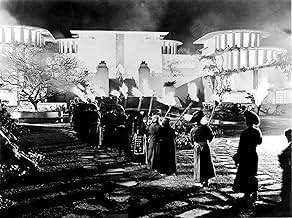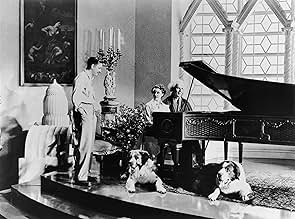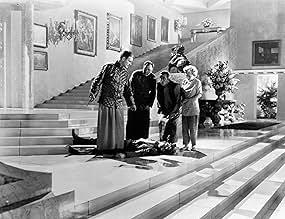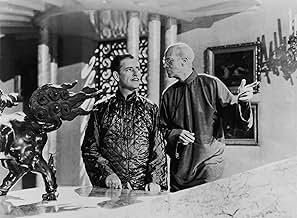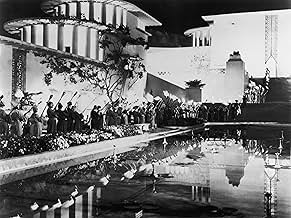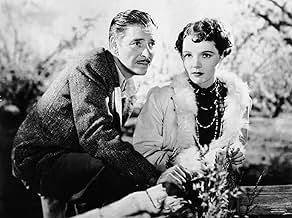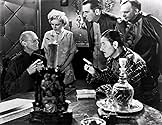AVALIAÇÃO DA IMDb
7,6/10
15 mil
SUA AVALIAÇÃO
Um acidente de avião leva um grupo de pessoas para a terra isolada de Shangri-La, mas é a utopia miraculosa que parece ser?Um acidente de avião leva um grupo de pessoas para a terra isolada de Shangri-La, mas é a utopia miraculosa que parece ser?Um acidente de avião leva um grupo de pessoas para a terra isolada de Shangri-La, mas é a utopia miraculosa que parece ser?
- Direção
- Roteiristas
- Artistas
- Ganhou 2 Oscars
- 6 vitórias e 6 indicações no total
Norman Ainsley
- Embassy Club Steward
- (não creditado)
Chief John Big Tree
- Porter
- (não creditado)
Wyrley Birch
- Missionary
- (não creditado)
Beatrice Blinn
- Passenger
- (não creditado)
Hugh Buckler
- Lord Gainsford
- (não creditado)
Sonny Bupp
- Boy Being Carried to Plane
- (não confirmado)
- (não creditado)
John Burton
- Wynant
- (não creditado)
Tom Campbell
- Porter
- (não creditado)
Matthew Carlton
- Pottery Maker
- (não creditado)
- Direção
- Roteiristas
- Elenco e equipe completos
- Produção, bilheteria e muito mais no IMDbPro
Avaliações em destaque
"I believe it because I want to believe it". This one line speaks volumes about what the movie (and the original novel) was trying to say. The concept of Shangri-La, a place where people work and live in peaceful harmony, is as relevant today as it was in the post-World War I era that James Hilton wrote 'Lost Horizon', where the world was still in turmoil following a devastating war and another was on its way.
In these days of war, humanitarian devastation and disease, how many people are there who dream of getting away from it all and living out their lives in a remote paradise just like Shangri-La? The High Lama's words to Conway resonate strongly even today.
"Look at the world today. Is there anything more pitiful? What madness there is! What blindness! What unintelligent leadership! A scurrying mass of bewildered humanity, crashing headlong against each other, propelled by an orgy of greed and brutality." On a more cinematographic note, the movie is visually stunning in an age before CGI and astronomical budgets. The beauty of Shangri-La, the stunning mountain landscapes and the overall settings of the movie make us believe that such a wonderful place can exist. All the actors are commendable in their portrayals (though some characters are different to those in the original novel) and their interaction with each other add a real sparkle to the movie.
'Lost Horizon' is a beautiful adaptation of James Hilton's masterpiece and captures the very feeling of the novel and I would highly recommend it to anyone who has ever dreamed of escaping from the hectic world in which we live.
In these days of war, humanitarian devastation and disease, how many people are there who dream of getting away from it all and living out their lives in a remote paradise just like Shangri-La? The High Lama's words to Conway resonate strongly even today.
"Look at the world today. Is there anything more pitiful? What madness there is! What blindness! What unintelligent leadership! A scurrying mass of bewildered humanity, crashing headlong against each other, propelled by an orgy of greed and brutality." On a more cinematographic note, the movie is visually stunning in an age before CGI and astronomical budgets. The beauty of Shangri-La, the stunning mountain landscapes and the overall settings of the movie make us believe that such a wonderful place can exist. All the actors are commendable in their portrayals (though some characters are different to those in the original novel) and their interaction with each other add a real sparkle to the movie.
'Lost Horizon' is a beautiful adaptation of James Hilton's masterpiece and captures the very feeling of the novel and I would highly recommend it to anyone who has ever dreamed of escaping from the hectic world in which we live.
There is an aura that seems to surround classic films made before the days of computer generated visual effects and intense marketing campaigns. It was a time when motion pictures depended on grand stories, superb performances, and great direction to catapult their success. This was exactly the case of `Lost Horizon,' a film from director Frank Copra (`It's A Wonderful Life'). With elaborate set designs, excellent performances by Ronald Colman, Jane Wyatt, John Howard, Thomas Mitchell, and Edward Everett Horton, `Lost Horizon' is a story of survival and ultimately finding a way home, that cannot be forgotten. `Lost Horizon' is a tale of five castaways who inadvertently find themselves in Shangri-La after their plane crashes in the mountains of Tibet. They are lead into the place of eternal youth, natural beauty, and free from strife by members of the region. They are treated as guests, and although they want to leave and find their way back to the world as they know it, porters are hard to find. It all leads to a notion that none of them want to admit; that they were meant to be in Shangri-La. Out of the thousands of movies that have been produced in the past 100 years, only a few afford of the privilege of remembrance. What's more, only a few seem to survive due to the nature of celluloid prints breaking down over time. A similar problem plagued `Lost Horizon,' in that after decades of worthy theatrical re-issues, the prints depreciated, with many withering away. As such, a preservation program was set in place to save copies of the film. Thanks to the works of countless individuals, this classic has been restored, to a certain degree, with some of the footage missing, replaced by still shots of the actors and recorded dialogue. From a critical standpoint, `Lost Horizon' has stood the test of time to be one of the greatest adventure classics ever produced by Hollywood. What is astonishing about this film is the attention to detail. As the film begins, a battle is taking place somewhere in China where we meet our protagonist, Bob Conway (Coleman). As the film continues, the scene changes to a scene on an airplane where our characters are trying to leave the war torn region. At one point, the crew is at a high altitude where the temperature is very cold. As such, we can see their breath in the shot as they speak. Normally, this kind of feature is ignored as the scene is short, but it adds a touch of realism that can't be denied. Incredible detail went into the creation of Shangri-La. With its large sets, beautiful costume design, the film takes on an epic proportion only rivaled by the grand designs of such Biblical epics as `Ben-Hur,' and `The Ten Commandments.' Truly, director Capra wanted to create an image that audiences would be astounded by
and he truly succeeded.
One can't help but admire the characters-they are all a bit naïve, but all intriguing in their own ways. Conway (Coleman) is a British diplomat and explorer whose fame is well deserved. His brother, George (Howard) presents a great deal of fear for the unknown Shangri-La. The characters of Henry Barnard (Mitchell) and Alexander P. Lovett (Horton) add a real sense of humor to the film. There are some minor inconsistencies in the story and various tasks that the characters try to pull off, but it's hardly worth complaining about because the film is such a treasure among other films. After 66 years, `Lost Horizon' remains far better than most of the adventure films that play in cinemas nowadays. One can only wish that they could have been present to see this in a theater during its original run. How amazing it would have been to see this epic tale of survival and the human struggle against itself back in 1937. `Lost Horizon' is indeed a remnant from the golden age of cinema. ***1/2
One can't help but admire the characters-they are all a bit naïve, but all intriguing in their own ways. Conway (Coleman) is a British diplomat and explorer whose fame is well deserved. His brother, George (Howard) presents a great deal of fear for the unknown Shangri-La. The characters of Henry Barnard (Mitchell) and Alexander P. Lovett (Horton) add a real sense of humor to the film. There are some minor inconsistencies in the story and various tasks that the characters try to pull off, but it's hardly worth complaining about because the film is such a treasure among other films. After 66 years, `Lost Horizon' remains far better than most of the adventure films that play in cinemas nowadays. One can only wish that they could have been present to see this in a theater during its original run. How amazing it would have been to see this epic tale of survival and the human struggle against itself back in 1937. `Lost Horizon' is indeed a remnant from the golden age of cinema. ***1/2
I think I was about seven or eight years old when I first saw this film, and has always lingered in the back of my mind. This is pure movie magic of a rare kind, and it is surprising how well it holds up today. The story is handled with just the right balance of seriousness and humour, with fine performances throughout, and the timeless message it sends is truly profound. The middle part may be lacking a bit in pacing, but it is a minor quibble, since this, for my money, is a masterpiece. And it still looks great, with impressive set design and an abundance of atmosphere. The finale is simply sublime, and stays in the mind for a long time afterwards, one of my favorite movie moments of all time. A movie everyone should see.
Frank Capra classic about a group of British citizens, led by diplomat Robert Conway (Ronald Colman), who flee a rebellion in China only to have their plane crash in the Himalayas. They are taken to Shangri-La, a magical place isolated in the mountains where people can leave behind the worries of civilization. They learn they will live for hundreds of years there but only if they never leave. The world-weary Conway is intrigued by the promise of this utopia but not everyone in his group feels the same way.
It's an ambitious undertaking for Capra, who made no other movies on the scale of this one (or with the budget). The costumes and Art Deco sets are beautiful. Great script from Robert Riskin, adapted from James Hilton's novel. Lovely, haunting score from Dimitri Tiomkin. Ronald Colman, an exceptional actor who never did a bad job that I've seen, gives a moving, sincere performance that ranks among the best of his impressive career. Sam Jaffe is also excellent in his small but important role as the High Lama. The rest of the wonderful cast includes John Howard, Jane Wyatt, Edward Everett Horton, H.B. Warner, Isabel Jewell, and Thomas Mitchell (the first of four movies he did with Capra). Jane Wyatt's swimming scene is probably the sexiest thing she ever did on film. The opening scenes are exciting and the climax is powerful. The middle of the film is where many people complain that it's slow or that it loses focus. I admit there is a chunk of the middle of the film, dealing with Colman and Wyatt falling in love, as well as everyone adjusting (or not adjusting) to Shangri-La that drags just a bit. But I never felt bored and I don't think it derails the film at all. The dialogue and performances in these scenes is still great. The original cut ran much longer and I can only imagine whether that version would be better or worse. As it is, seven minutes of footage is still missing from the current version. The dialogue for these scenes is intact, with production stills in place of the missing footage.
It's escapism, pure and simple. Many viewers will poke holes in the idea and philosophy behind Shangri-La, calling it naive and childish. Perhaps they're right; perhaps the cold, cynical reality of selfish human nature means such a utopia is impossible. But the thing about most of Frank Capra's films, and why he is probably my favorite director ever, was that he believed in telling uplifting, optimistic stories about us helping each other overcome our baser nature; that good can triumph over evil and there are such things as happy endings. While Lost Horizon is not really one of his "Capra-corn" movies, I think the basic Capra elements are still there, right down to the final shot. Most other directors would have likely gone for the sad or tragic ending, but Capra gives us one that is hopeful.
It's an ambitious undertaking for Capra, who made no other movies on the scale of this one (or with the budget). The costumes and Art Deco sets are beautiful. Great script from Robert Riskin, adapted from James Hilton's novel. Lovely, haunting score from Dimitri Tiomkin. Ronald Colman, an exceptional actor who never did a bad job that I've seen, gives a moving, sincere performance that ranks among the best of his impressive career. Sam Jaffe is also excellent in his small but important role as the High Lama. The rest of the wonderful cast includes John Howard, Jane Wyatt, Edward Everett Horton, H.B. Warner, Isabel Jewell, and Thomas Mitchell (the first of four movies he did with Capra). Jane Wyatt's swimming scene is probably the sexiest thing she ever did on film. The opening scenes are exciting and the climax is powerful. The middle of the film is where many people complain that it's slow or that it loses focus. I admit there is a chunk of the middle of the film, dealing with Colman and Wyatt falling in love, as well as everyone adjusting (or not adjusting) to Shangri-La that drags just a bit. But I never felt bored and I don't think it derails the film at all. The dialogue and performances in these scenes is still great. The original cut ran much longer and I can only imagine whether that version would be better or worse. As it is, seven minutes of footage is still missing from the current version. The dialogue for these scenes is intact, with production stills in place of the missing footage.
It's escapism, pure and simple. Many viewers will poke holes in the idea and philosophy behind Shangri-La, calling it naive and childish. Perhaps they're right; perhaps the cold, cynical reality of selfish human nature means such a utopia is impossible. But the thing about most of Frank Capra's films, and why he is probably my favorite director ever, was that he believed in telling uplifting, optimistic stories about us helping each other overcome our baser nature; that good can triumph over evil and there are such things as happy endings. While Lost Horizon is not really one of his "Capra-corn" movies, I think the basic Capra elements are still there, right down to the final shot. Most other directors would have likely gone for the sad or tragic ending, but Capra gives us one that is hopeful.
Fantasy filled film that shows the different facaets of human nature. Beautifully conceived by Frank Capra whose brilliant at making films with sentlemenity as main force. A masterpiece which was brutally cut during its threaitcal run and only recently has the film been somewhat restored. Thus, the complete version of Lost Horizon(1937) is one of many lost classics in history of film. Acting is excellent with everyone giving deep performances. An wonderful story with intriquing spirital symbolisms. Ronald Colman does a marvalous job as the good natured and tolerate Robert Conway. Personally I perfer Lost Horizons(1937) over Its a Wonderful Life(1946) because the main character in the former is more complex.
Você sabia?
- CuriosidadesThe year after this film was released the owner of a prosperous theater chain hired an architect who designed a mansion that was inspired by the Shangri-La lamasery in this film. Located in Denver, Colorado, it still exists today.
- Erros de gravaçãoEchoing the words of the critic, James Agate: 'The best film I've seen for ages, but will somebody please tell me how they got the grand piano along a footpath on which only one person can walk at a time with rope and pickaxe and with a sheer drop of three thousand feet or so?'
- Cenas durante ou pós-créditosBob Gitt of the UCLA Film & Television Archives claims the original opening sequence in 1937 had title cards "Conway has been sent to evacuate ninety white people before they're butchered in a local revolution" was changed in 1942 for a special reissue during WWII. The title cards read "before innocent Chinese people were butchered by Japanese hordes." This was to bolster propaganda against the Japanese.
- Versões alternativasSome of the music in the restored version is dubbed into different sections than the ones in the 118 minute cut version. For example, the moment in which Robert Conway ('Ronald Colman') discovers that the High Lama is really Father Perrault i accompanied by soft music in the cut version, while in the restored version this moment is played with no music.
- ConexõesEdited from Stürme über dem Mont Blanc (1930)
- Trilhas sonorasWiegenlied (Lullaby) Op. 49 No. 4
(1868) (uncredited)
Composed by Johannes Brahms
English translator unknown
Sung a cappella by children at Shangri-La
Principais escolhas
Faça login para avaliar e ver a lista de recomendações personalizadas
Detalhes
- Data de lançamento
- País de origem
- Central de atendimento oficial
- Idiomas
- Também conhecido como
- Horizontes Perdidos
- Locações de filme
- Empresa de produção
- Consulte mais créditos da empresa na IMDbPro
Bilheteria
- Orçamento
- US$ 4.000.000 (estimativa)
- Tempo de duração2 horas 12 minutos
- Cor
- Proporção
- 1.37 : 1
Contribua para esta página
Sugerir uma alteração ou adicionar conteúdo ausente


